A noisy car AC compressor can not only ruin your driving experience but also be a sign of impending costly repairs? Here I’ll discuss how to quiet a noisy car AC compressor, ensuring a more comfortable driving experience and saving you from expensive repairs.
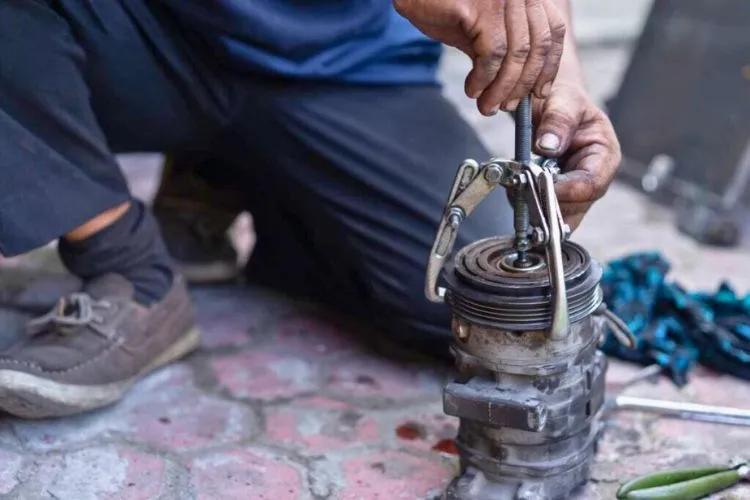
I will also explore the common causes of a noisy compressor, such as worn-out bearings and loose belts, and provide you with practical solutions to address these issues.
Table of Contents
how to quiet a noisy car ac compressor?
A noisy car AC compressor can be both an annoyance and a sign of potential problems in your vehicle’s air conditioning system. Common causes of this issue include worn-out bearings, loose belts, and system leaks. Addressing the problem promptly improves your driving experience and prevents further damage and costly repairs.
1. Identify the issue
To determine if the noise is coming from your AC compressor, turn on your car’s AC and listen carefully. If the noise increases with the AC running, it’s likely the compressor. Common symptoms of a noisy compressor include loud grinding, rattling, or clicking noises.
2. Troubleshoot the problem
Inspect the AC system for leaks, damages, or debris. Look for any signs of refrigerant leaks, such as oily residue around fittings or connections.
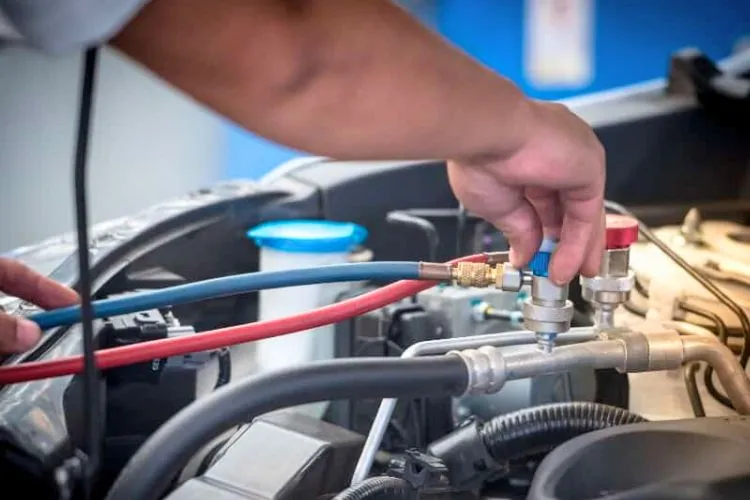
Check the compressor belt for wear, damage, or improper tension. Replace or adjust the belt if necessary.
Examine the compressor clutch and pulley for wear or damage. If these components are damaged, they may need to be replaced.
3. Fix the issue
Add lubricant: If the compressor is noisy due to a lack of lubrication, adding the appropriate AC compressor oil can help. Consult your vehicle’s manual for the correct type and amount of oil.
Tighten bolts: Loose bolts on the compressor can cause noise. Use a wrench to tighten loose bolts, ensuring they are secure but not over tightened.
Always follow safety precautions when working on your vehicle, including disconnecting the battery and wearing protective gear.
4. Prevent future problems
Perform regular checks of your AC system, including inspecting belts, hoses, and connections for wear or damage.
Clean the AC system periodically to remove debris and maintain proper airflow.
Schedule routine maintenance with a professional to ensure your AC system stays in good working order.
In summary, resolving a noisy car AC compressor involves identifying the issue, troubleshooting the problem, and applying the appropriate fixes. Regular maintenance can help prevent future issues. If you’re unsure about any steps or the problem persists, it’s always best to consult a professional mechanic.
Car AC compressor noise when AC is off: Causes and Solution
Here, I will explore the reasons behind this issue, the symptoms to look out for, and the solutions to fix the problem. We will also share some maintenance tips to help prevent the issue from recurring.
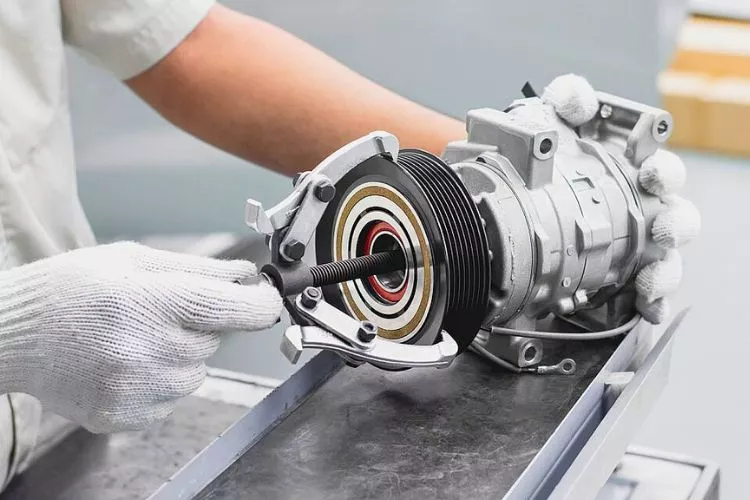
🚗 Causes
Lack of lubrication: Insufficient lubrication can cause the compressor to make a noise even when the AC is off. This may be due to a refrigerant leak or a low compressor oil level.
Malfunctioning clutch: The AC compressor clutch engages and disengages the compressor as needed. If the clutch malfunctions, it may not disengage properly when the AC is turned off, causing the compressor to run unnecessarily and create noise.
Electrical issues: Electrical problems, such as a faulty relay or wiring, can cause the compressor to run even when the AC is switched off, leading to noise.
Faulty compressor: A damaged or worn-out compressor can make a noise when the AC is off due to internal components not functioning correctly.
🚗 Symptoms
Strange noises: Grinding, clicking, or rattling noises from the AC compressor when the AC is off.
Vibrations: Unusual vibrations are felt through the vehicle when the AC is off.
Unusual smells: A burning smell or other unusual odors from the AC system when the AC is off.
🚗Solutions
Check for leaks: Inspect the AC system for refrigerant leaks and repair them as needed.
Recharge the AC system: If the refrigerant level is low, recharge the AC system with the appropriate refrigerant.
Replace the compressor: If the compressor is damaged or worn out, it may need to be replaced.
Seek professional help: If you are unsure about the cause of the problem or how to fix it, consult a professional mechanic for assistance.
Car AC compressor whining noise when accelerating: Causes and Solution
Various factors, such as a worn-out belt, a faulty compressor, or a lack of lubrication, can cause this issue. In this guide, we will explore the potential causes of this problem, provide actionable solutions to fix it and share tips on preventing the issue from happening in the future.
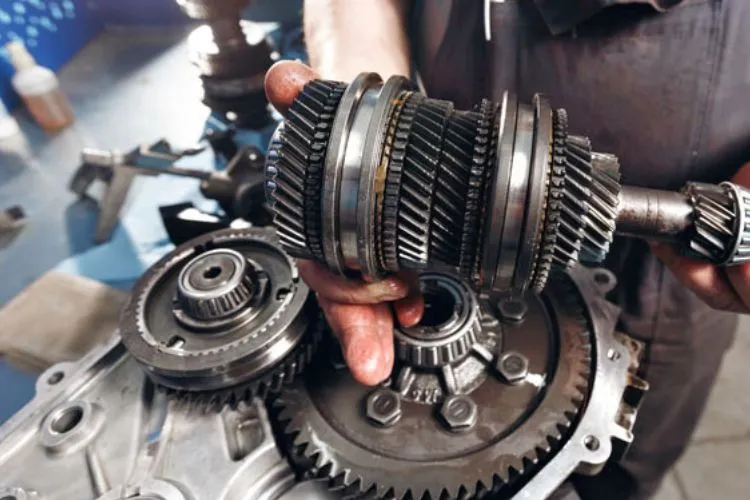
🚗 Causes of the whining noise in the car AC compressor when accelerating
Worn-out or loose belt: The serpentine belt, which drives the AC compressor, can wear out or become loose over time. As a result, it may slip and create a whining noise when you accelerate.
Faulty compressor: The AC compressor is a complex component with several moving parts. If any of these parts become damaged or worn out, it can cause the compressor to make a whining noise when accelerating.
Lack of lubrication: Insufficient lubrication in the AC compressor can cause friction between its internal components, leading to a whining noise when accelerating.
Malfunctioning clutch: The AC compressor clutch engages and disengages the compressor as needed. If the clutch is not functioning correctly, it may cause the compressor to make a noise when accelerating.
🚗 Solutions to fix the problem
Inspect and replace the serpentine belt: Check the serpentine belt for wear, damage, or improper tension. If necessary, replace the belt or adjust its tension.
Check the compressor for damage: Inspect the AC compressor for any signs of damage or wear. If the compressor is faulty, it may need to be replaced.
Lubricate the AC compressor: If a lack of lubrication causes the whining noise, add the appropriate AC compressor oil to the system. Again, consult your vehicle’s manual for the correct type and amount of oil.
Inspect and replace the compressor clutch: If the clutch is malfunctioning, it may need to be replaced. Consult a professional mechanic for assistance with this task.
Seek professional help: If you are unsure about the cause of the problem or how to fix it, consult a professional mechanic for assistance.
🚗 Prevention tips
Regularly inspect the AC system: Check the compressor, belts, hoses, and connections for wear or damage.
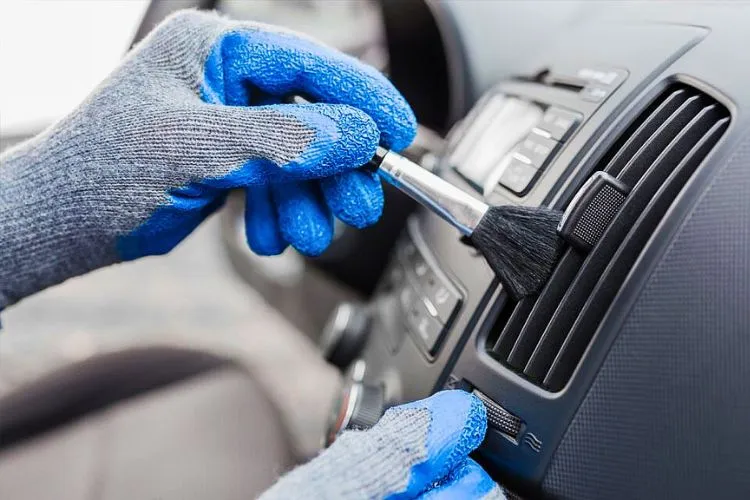
Keep the compressor clean: Clean the AC system periodically to remove debris and maintain airflow.
Use the AC system regularly: Running the AC system regularly helps to keep the compressor lubricated and in good working order.
Schedule routine maintenance: Regular maintenance by a professional mechanic can help identify and address potential issues before they become serious problems.
By identifying the cause and applying the appropriate solutions, you can resolve this issue and ensure a comfortable driving experience. In addition, regular maintenance and inspections can help prevent the problem from recurring. If you are experiencing this issue, don’t hesitate to take action and seek professional help if necessary.
You May Also Find Useful: Can a Low Car Battery Affect the Air Conditioning?
Conclusion
A noisy car AC compressor can significantly impact your driving comfort and may indicate underlying issues within your vehicle’s air conditioning system.
By following the guidelines and solutions in this article, you can effectively diagnose the root cause of the noise and take the necessary steps to quiet your AC compressor.
Regular maintenance, proper lubrication, and addressing any component wear or damage promptly are crucial to ensuring a smooth and quiet AC system.
